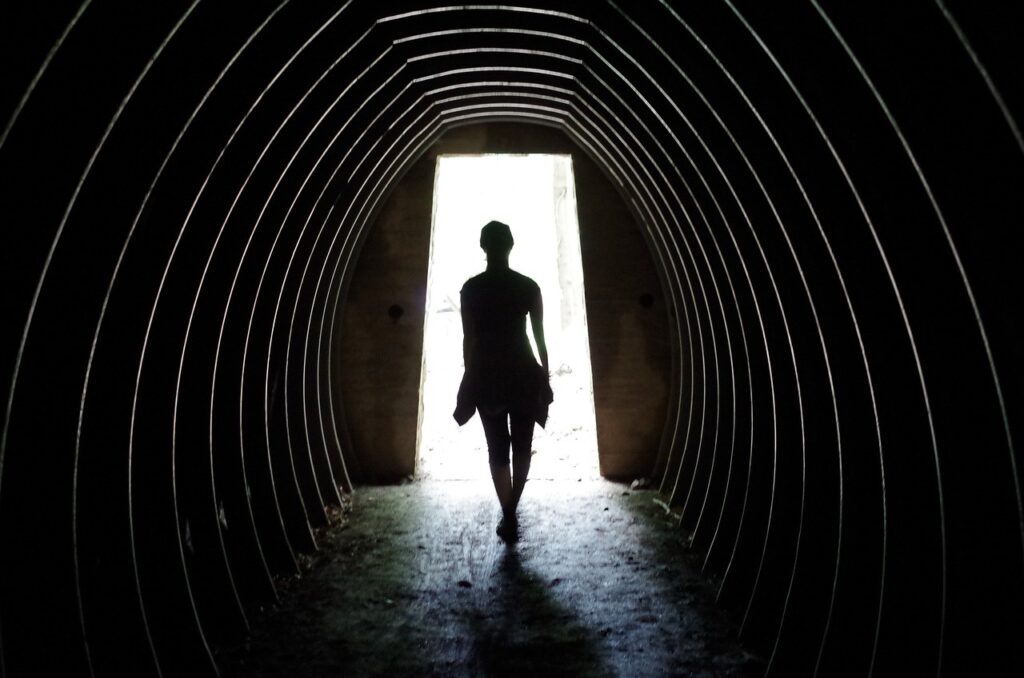Let what comes come. Let what goes go. See what remains– Ramana Maharshi
The quote above is something that has guided me during particularly tumultuous times on my path. Those times are almost always when I am going through an initiation of some sorts – when I have needed to let go of parts of self or ways of being that I was clinging to out of fear or out of habit.
Robert Anton Wilson once said, “beyond a certain point, the whole universe becomes a continuous process of initiation”.
I do find this to be true in so many ways. We so often fear change without the recognition that each moment and every decision we make ushers in change. Even without our active participation our body and mind changes (for example, our taste buds change every two weeks and our body replaces about 330 billion cells per day).
Our inherent spiritual nature is one of change and movement. It is our stuckness, typically out of fear and habit, that creates issues in our lives.

An act of initiation is often considered a beginning, an ushering in, particularly of a new skill or a new stage of being.
While we have the moment-to-moment, day-to-day type initiations of our lives, we also have larger initiations. For example, from one stage of life to another (like young adulthood to adulthood). Or from one way of being to another (graduation, new job, marriage to divorce, moving, death of a parent, child, or loved one, birth of a child or grandchild).
While these types of larger initiations will certainly change us spiritually, we also have spiritual initiations that are more about identity– how we see ourselves and the world. They also may involve developing more personal or spiritual power or capacity (for example, in shamanic initiations the development of new spiritual skills to assist others or the encountering of new spiritual teachers or guides).
Initiations are best described as a doorway opening. It takes time for us to recognize that this doorway is opening, typically even longer to move through it, and then longer still to be fully through that doorway to the point of recognizing and integrating what we have been through.

We so often consider our consciousness to be one solid unit, one self. But in reality we have parts of self that may be in the distant past (with our ancestors, for example), in the present, and also in the future.
This means for initiations that we may have parts of ourselves already through that doorway, born anew into our new identity, a new state of wholeness or consciousness, parts of ourselves wondering what the heck is going on, and parts of ourselves that linger in states of ignorance or darkness.
The good news is that to cross the threshold of that doorway does not require every single bit of our consciousness to move forward– it seemingly is just enough awareness to have a part of ourselves ready to move forward.
The other thing that is quite helpful to keep in mind is that by the time that we recognize that we are undergoing an initiation, a significant part of ourselves has already completed it.
This is because there is always fear regarding change. We are used to what we are used to, even if we desperately desire a shift.
When we can recognize that a part of us has already made it past the doorway, we feel more ready and willing for the parts of us still clinging to habit and fear to cross that threshold.

There are two places that people often get stuck in terms of initiations. The first is in the “death” process of the “death and rebirth” cycle.
In order for us to be born anew, something within us must die. A part of who we thought we were, how we see the world, even the suffering and pain we are so used to carrying we might be resistant to releasing.
On a more practical level, initiations often result in physical and emotional shifts, not just energetic-spiritual ones. This means that when our identity changes, our consciousness expands, or we feel more powerful and embodied, our relationships, hobbies, and the way we interact in the world are likely to change.
So this can mean that “death” of friendships, relationships, careers, and so forth. But if we are able to understand that these things only “die” because there was something troubled or out of balance with them in the first place, we can be willing to release them. Healthy relationships will welcome change, even if those changes take a bit of time to get used to.
In some cases relationships do not need to end completely, but can undergo a period of recalibration where your new self can meet your friend or your loved one anew.

The second place where people get stuck is when the vast majority of our self is through that doorway and the door behind us needs to close so we can fully move forward.
To complete the initiation, so to speak.
It should be noted that initiations can take considerable time. Sometimes things shift in a moment, or a few weeks, but some initiations can last for years or even decades. On occasion this is because a part of us is still clinging to who we were, unwilling to go through that door.
In other cases, initiations taking time is totally natural and understandable. They take time to process and integrate and fully complete.
But so often we get used to who we were, and to let go, even if we are called to do so, even if we are miserable and tired and aware of the fact that it is truly time to let go, is hard to ask of ourselves.
It is by letting ourselves let go, to feel that something larger, something of a spiritual nature, flowing through us, that we can fully move through that doorway and see the door shut and dissolve behind us.
We so desire control, and there are times in our lives when letting go of that illusion is what is necessary.
It is at that point that we can flow with the changes, and even the initiations, of our existence.
Mary Mueller Shutan is a spiritual teacher and author of several books, including Shadow Work for the Soul, The Shamanic Workbook series, Managing Psychic Abilites, and Working with Kundalini. You can find her teaching schedule here

25 yrs. I’ve been tormented to get my life in the place where I can figure allof this out. Wow what a ride. Including a long12 year prison sentence.This has been a long arduous journey. Including dealing with bad health. Hoping to bring it home, Paul
Hi Derek-
I would agree that having someone mirror back to us our accomplishments, or to validate what we have gone through, with recognition and celebration is incredibly important. There is of course also the impact of the energies of more than one person creating a group field which creates a lot of power as well, especially if it is more than one person completing the initiation at once (for example, graduation), or many people celebrating a person at once (weddings, funerals).
thanks for your thoughts!
Thanks for this article, Mary!
Something I’ve been contemplating related to the idea of completing an initiation process is community ritual and reception. It occurs to me that a powerful outcome of rights of passage and public initiation ceremonies in traditional societies is that the community receives the new initiate or person on the other side of their right of passage, reflecting back to them the new facet of identity or place in the community that they have newly emerged into. That sort of reception, I imagine can be a very powerful way of completing an initiation, particularly one that involves a significant change in identity as that identity is now validated and reflected by the community.
I think the lack of such receptions has a major impact on completion of initiations. Wonderful article!
You are welcome, Fleur. Glad the blog was helpful to you
Thank you, Mary. This blog gives courage.
You are welcome, Annette. Glad it resonated with you
Mary thank you. This article has helped me understand initiation and doorways and my dual spark of enthusiasm and resistance inhabiting my experience. It is gracious to see both and give myself time and permission to acknowledge my resistance with more compassion. Huge thanks